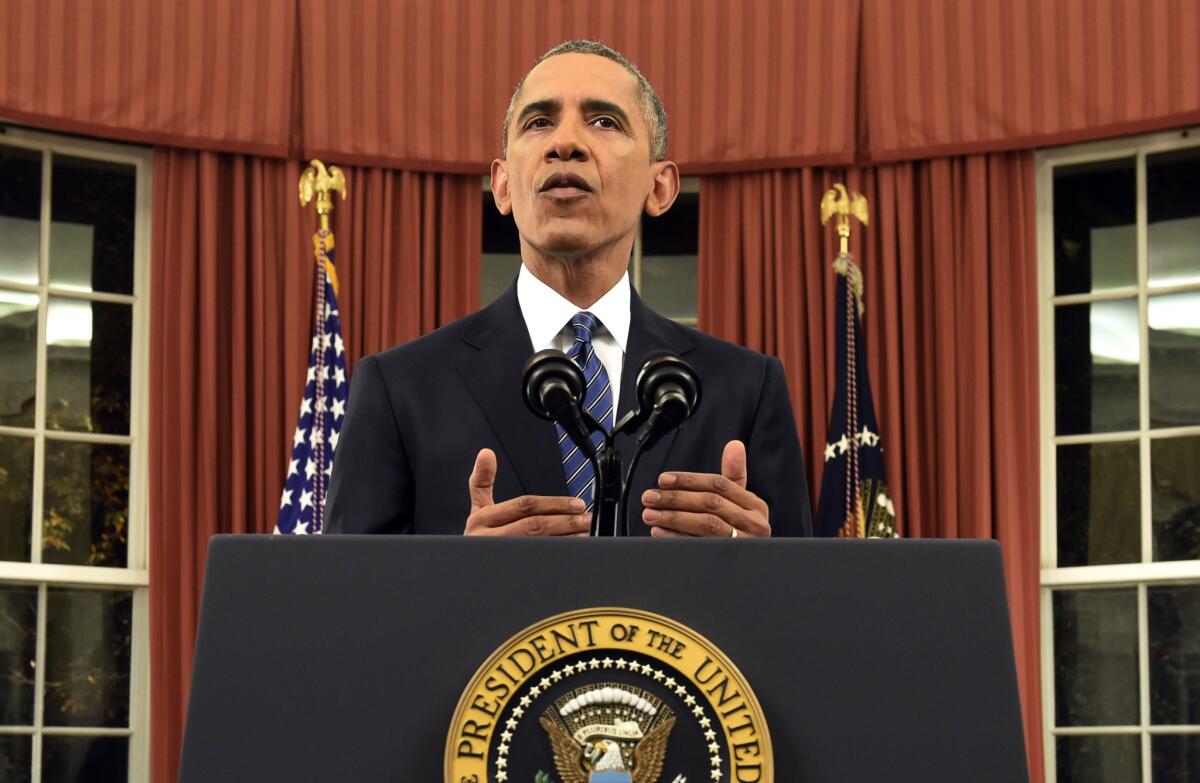Critic’s Notebook: Obama’s speech bypasses Islamic State war cry to focus on Americans’ state of mind

President Barack Obama addresses the nation from the Oval Office at the White House in Washington, Sunday night, Dec. 6, 2016.
No one will ever accuse President Obama of unnecessary theatrics.
Though many considered Sunday night’s speech a perfect, even necessary, moment for a full-blown war cry against Islamic State, the president instead spent more time addressing the American state of mind than any threat outside our borders.
Though he decried the massacre in San Bernardino as terrorism and vowed to use “all of America’s power” to destroy Islamic State, which he characterized as “thugs, killers, a cult of death,” Obama seemed intent on avoiding a Bill-Pullman-in-”Independence Day” moment.
SIGN UP for the free Essential Arts & Culture newsletter >>
He was not trying to rally the troops so much as the forces of our better natures.
Far from announcing any big new plans, the president simply outlined what his administration is doing to combat terrorism and pledged to continue the fight.
Then he turned his attention inward, asking for stricter gun laws, calling on Muslim communities to root out radicalism and reminding Americans that diversity and tolerance were the very values Islamic State threatened and so should not be jettisoned, even in times of fear.
Needless to say, many people were very disappointed, after all the buildup, that the speech did not appear to follow “the narrative.”
And there was a lot of talk about “the narrative” in the hours leading up to the speech. As the continuing investigation in San Bernardino revealed the killers’ support of radical jihad, expectations grew accordingly. Much was made of Obama’s very rare decision to use the Oval Office. Historically, he has preferred the less iconic East Wing.
Instead of presidential acknowledgment, reassurance and perhaps some words about the debate over gun violence that has filled the news, the speech grew to something bigger and more definitive.
Something a bit more than saber-rattling.
Citing polls that show a majority of Americans are not happy with the way Obama is handling the war on terrorism, pundits likened the level of fear to post-9/11 levels. Cable news networks churned with accusations that the president and/or those around him had rejected early warnings about the rise of Islamic State (also called ISIS or ISIL) because they did not fit “the administration’s narrative” regarding foreign policy.
Virtually everyone agreed that Obama needed to use Sunday’s speech to “change the narrative” on terrorism and, indeed, his presidency. Many suggestions were made: He should make Americans feel safe and prove there is firm resolve and a new strategy to take down terrorism. He should apologize for underestimating Islamic State and radical Islam, and then explain how we are going to keep them out and take them down.
Excepting the apology, he did most of these things, albeit in a highly measured way. He spoke slowly, and paused often, as if to allow his points to sink in. And though he denounced “the dark path of radicalization,” he spoke little about the terrorists, as if to avoid giving them the attention they crave.
Instead, the speech focused on Americans and our need to remain vigilant, to protest laws that allow those on the “no-fly” list to buy guns and rhetoric that would send troops to the Middle East.
Most important, he warned against allowing fear to cloud our judgment.
“Just as it is the responsibility of Muslims around the world to root out misguided ideas that lead to radicalization,” he said, “it is the responsibility of all Americans — of every faith — to reject discrimination.… Because when we travel down that road, we lose. That kind of divisiveness, that betrayal of our values plays into the hands of groups like ISIL.”
Terrorists use random acts of violence to disorient a populace, to make people so afraid they can no longer think of anything larger than their personal safety. Including democracy, including civilization.
MORE ON OBAMA’S ADDRESS
Obama seeks to calm Americans on terror threat, but speech underscores challenges
Why the White House rushed to correct Obama on his visa waiver mistake
ISIS to immigration: See how Obama divided his 13 minutes
The complete guide to home viewing
Get Screen Gab for everything about the TV shows and streaming movies everyone’s talking about.
You may occasionally receive promotional content from the Los Angeles Times.




